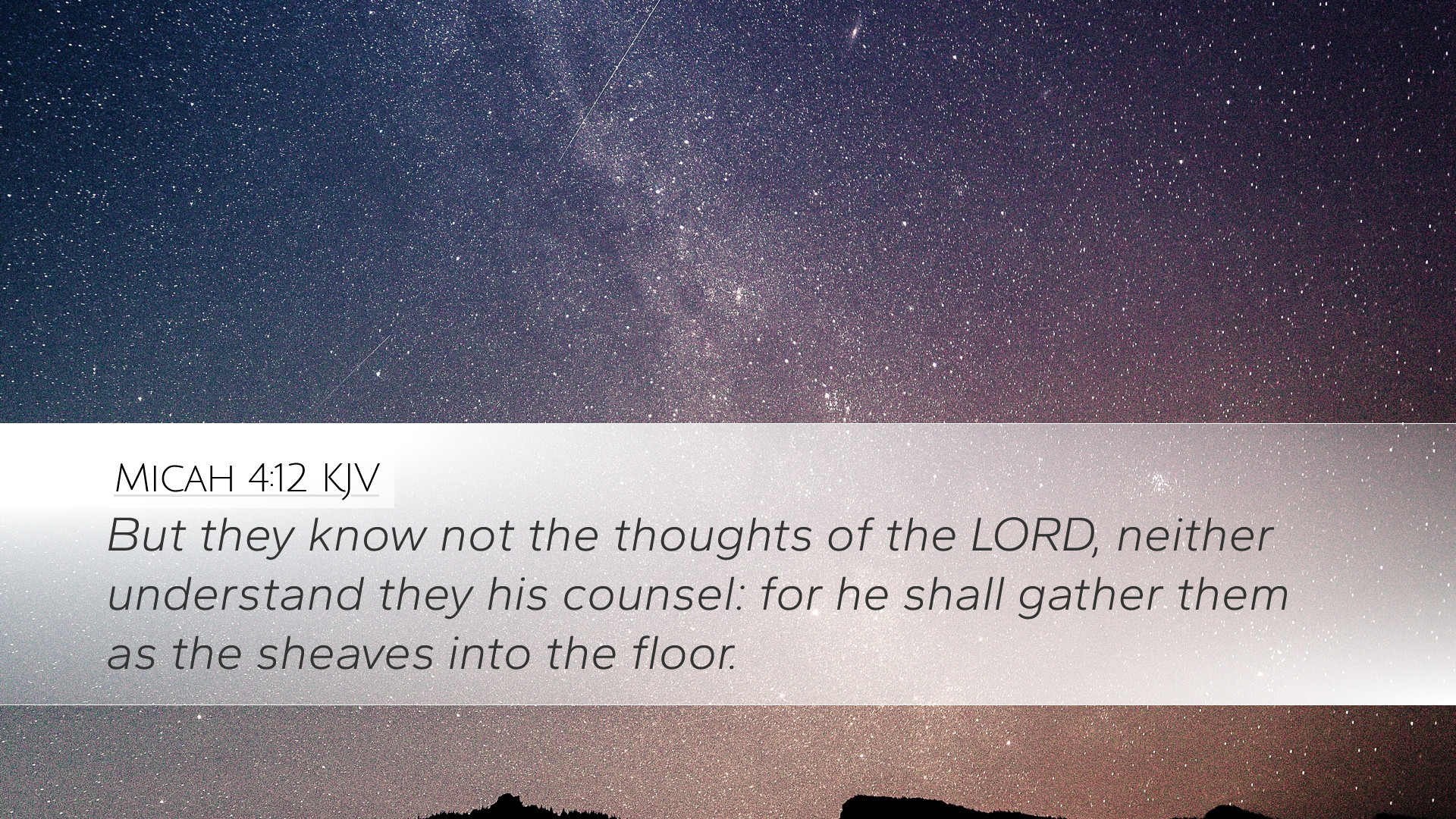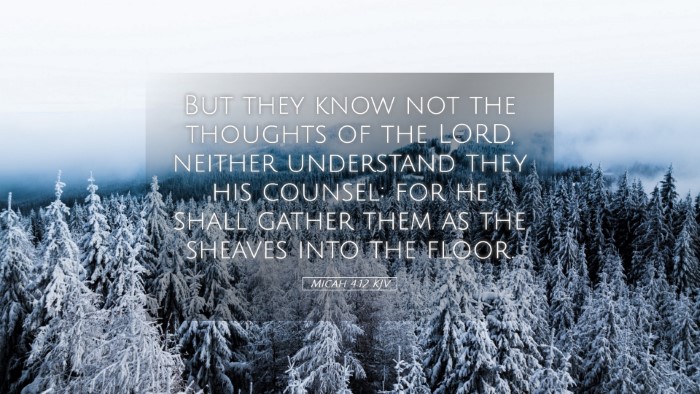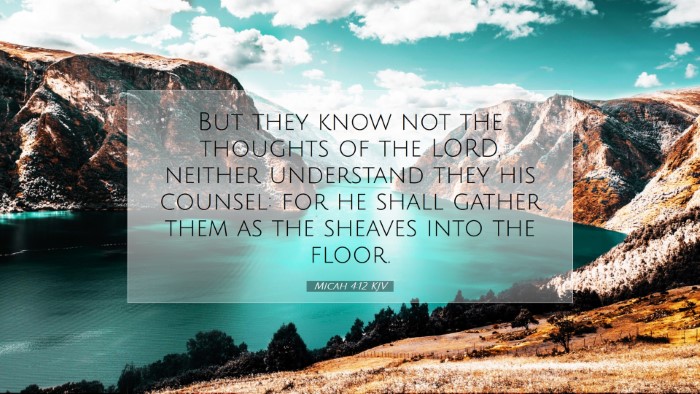Old Testament
Genesis Exodus Leviticus Numbers Deuteronomy Joshua Judges Ruth 1 Samuel 2 Samuel 1 Kings 2 Kings 1 Chronicles 2 Chronicles Ezra Nehemiah Esther Job Psalms Proverbs Ecclesiastes Song of Solomon Isaiah Jeremiah Lamentations Ezekiel Daniel Hosea Joel Amos Obadiah Jonah Micah Nahum Habakkuk Zephaniah Haggai Zechariah MalachiMicah 4:12
Micah 4:12 KJV
But they know not the thoughts of the LORD, neither understand they his counsel: for he shall gather them as the sheaves into the floor.
Micah 4:12 Bible Commentary
Commentary on Micah 4:12
Bible Verse: Micah 4:12 - "But they know not the thoughts of the Lord, neither understand they his counsel: for he shall gather them as the sheaves into the floor."
Introduction
This verse from Micah serves as a powerful reminder of the limitations of human understanding in contrast to the omniscience of God. Within this commentary, insights from notable public domain theologians, such as Matthew Henry, Albert Barnes, and Adam Clarke, provide a holistic exploration of this passage.
The Context of Micah
The prophetic book of Micah addresses the themes of judgment, hope, and restoration. Micah prophesied during a time of moral decay and national instability in Israel, foreseeing God's impending judgment but also a future hope for restoration. This verse, located within a prophetic framework, serves to highlight the futility of human plans against the divine purposes of God.
Micah 4:12 Explained
The verse specifically critiques the ignorance of the people regarding the intentions of the Lord. Micah emphasizes that they "know not the thoughts of the Lord." This expresses a profound relational disconnect. God's people have failed to understand the depth of His counsel, which indicates not only a lack of knowledge but also a failure in faithfulness and obedience.
Insights from Commentators
This section synthesizes insights from Matthew Henry, Albert Barnes, and Adam Clarke, providing depth to the understanding of Micah 4:12.
Matthew Henry's Commentary
Matthew Henry elucidates that the ignorance of the people about God’s thoughts reveals their spiritual blindness. He notes:
- Human Limitations: Henry emphasizes the limitation of human perception in comprehending divine counsel. The phrase "know not the thoughts of the Lord" signifies a deep-rooted inability to grasp God’s overall plan and intentions.
- Divine Sovereignty: He highlights the sovereignty of God in gathering nations for judgment. The metaphor of gathering sheaves illustrates how God orchestrates events according to His own wisdom, irrespective of human understanding.
- Call to Awareness: Henry calls the faithful to recognize and submit to God’s plans, urging them to seek understanding through humility and reliance on divine revelation.
Albert Barnes' Commentary
Albert Barnes provides a contextual analysis emphasizing the seriousness of the ignorance exhibited by the people:
- Consequences of Ignorance: Barnes explains that this ignorance has dire consequences, leading the people into destructive behaviors and misaligned expectations of God's will.
- Gathering as Sheaves: He expands on the imagery of the sheaves being gathered, signifying not only the judgment but also the eventual restoration—a theme prevalent in prophetic literature.
- Divine Counsel vs. Human Understanding: Barnes contrasts divine wisdom with human folly, encouraging believers to align their lives with God’s counsel rather than their own flawed perceptions.
Adam Clarke's Commentary
Adam Clarke offers a theological perspective that intertwines this passage with the broader narrative of scripture:
- The Nature of God’s Thoughts: Clarke delves into the nature of God’s thoughts, asserting that they are infinitely higher than human thoughts. This understanding fosters a sense of awe and reverence toward God.
- Symbolism of Sheaves: He reflects on the gathering of sheaves not only as a metaphor for judgment but also as a means of divine purification, whereby the faithful may be preserved amidst judgment.
- Encouragement to Seek God: Clarke emphasizes the need for seeking God’s revelations and understanding to avoid the pitfalls of ignorance presented in this passage.
Theological Implications
This passage invites deeper theological reflection about the nature of God and humanity. It prompts readers to consider the following themes:
- God’s Omniscience: The profound gap between God's infinite wisdom and human understanding underscores the necessity for humility as we navigate faith.
- Response to Divine Counsel: Believers are called not only to seek understanding but to respond in obedience to what God reveals, which implications that correct interpretation leads to faithful living.
- Hope in Restoration: The transition from judgment to restoration in Micah serves as a reminder of God's redemptive plan amidst adversity, fueling hope for the future.
Practical Applications
For pastors, students, theologians, and Bible scholars, the implications of this verse can be applied in various aspects:
- Expository Preaching: This verse can serve as a foundation for sermons addressing the importance of discernment and understanding God’s will amidst worldly confusion.
- Biblical Literacy: Encouraging congregations to engage deeply with scripture fosters a communal pursuit of understanding, reflecting the need for spiritual growth.
- Discipleship and Mentoring: Teaching others about the supremacy of God’s thoughts encourages reliance on divine wisdom rather than human reasoning in practical life situations.
Conclusion
Micah 4:12 encapsulates the essential truths regarding human understanding and divine wisdom. The synthesis of insights from Matthew Henry, Albert Barnes, and Adam Clarke provides a rich tapestry of interpretation that challenges readers to recognize their limitations and embrace the omnipotent counsel of God. By seeking to align oneself with God's thoughts and purposes, believers can navigate life's complexities with a profound sense of faith and assurance in the divine plan.


